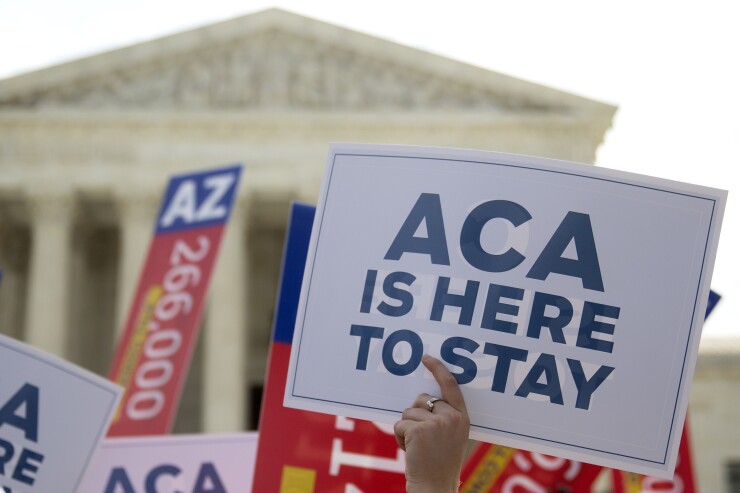One of the year-end routines faced by employees with employer-provided health care is the plan elections required every year. With the coronavirus pandemic still very much ongoing, these may be especially important this year — and they involve a number of important tax considerations.
Among the tax issues are the individual mandate and the constitutionality of the Affordable Care Act itself, according to Mark Luscombe, principal federal tax analyst at Wolters Kluwer Tax & Accounting.
“The individual mandate was repealed in 2019,” he said. “It required a payment with a tax return for failure to maintain minimum essential health insurance coverage. And the Supreme Court will be reviewing a case that may determine if the repeal of the individual mandate invalidates the entire Affordable Care Act.”
In California v. Texas, a group of states are challenging the constitutionality of the ACA. The case is scheduled to be heard before the court on Nov. 10, 2020.
“For now, the ACA is still in place,” Luscombe said. “Open enrollment with the health insurance marketplace continues normally for 2020. The open enrollment period is from Nov. 1, 2020, to Dec. 15, 2020, with coverage starting Jan. 1, 2021. A special enrollment period with the health insurance marketplace may also be available for the remainder of 2020 for people who have special situations, such as lost health coverage, getting married, moving, or having a baby or adopting a child.”

“The IRS allowed people to make mid-year changes to their plans due to the pandemic,” Luscombe noted. “But even if they did 2020 revisions to their health plans and FSAs, they must enroll again for 2021.”
Medicare, he noted, has a separate enrollment period from Oct. 15 to Dec. 7, and eligible low-income individuals may enroll in Medicaid or the Children’s Health Insurance Program, or CHIP.
The medical expense deduction, which for many years had to exceed 7.5 percent of adjusted gross income, was raised to 10 percent, but was set back at 7.5 percent for 2020, according to Luscombe. “However, it will revert back to 10 percent of AGI in 2021 unless Congress acts to change it,” he said. “A lot of people were postponing elective surgeries because they didn’t want to be in the hospital during the COVID-19 pandemic, But there could be an advantage to having the surgery done in 2020 in order to take advantage of the lower AGI threshold.”
“Of course, it’s possible that the low threshold could become one of the regularly expiring provisions that Congress always gets around to extending retroactively, so they might do that for 2021,” he added.
For those with a high-deductible health plan, including a marketplace plan, Luscombe recommends enrolling in a health savings account.
“They’re still out there, and are one of the best vehicles the IRS has to offer,” he said. “Not only does the holder get an upfront deduction, but there’s deferral while the money is in the account, and a tax-free withdrawal if the money is used for qualified medical expenses. For the 2020 plan year, the minimum deductible is $1,400 for an individual and $2,800 for a family.”
The other tax-saving vehicle, flexible spending accounts, are also widely used, Luscombe indicated. “They’re older than HSAs,” he said. “The money contributed to an FSA is not taxed, so the individual will save an amount equal to the taxes they would have paid. The drawback is a ‘use it or lose it’ feature which makes them less popular.”





